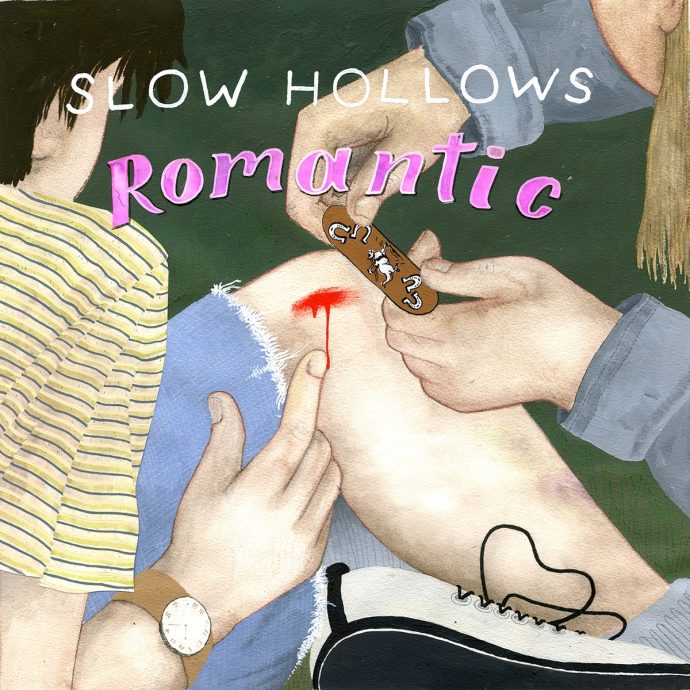It’s been little over a year since Austin Feinstein– the 18-year-old force behind Slow Hollows –has released a record, and 3 years since the groups debut album, I’m Just as Bad as You Are. Slow Hollows third album, Romantic, is not a substantial evolution over last year’s Atelophobia. Instead, Romantic is a solid, well produced effort– displaying just enough sonic experimentation to keep most fans invested.
Romantic, in society’s general perception of the word, is not the most appropriate way to describe this record. There are no love songs on the album. Instead, the reoccurring motifs on the record deal with solitude and isolation, loss, heartache, and depersonalization. On the opening track “Spirit Week,” Feinstein speaks of a life filled with loneliness, “I live a life alone/Nothing is real/Nobody’s home,” and how he’d rather be dreaming than face realities. The delicate and haunting guitar arpeggios throughout the song relay a sense of apathy and lethargy, contradictory to the tracks title. He repeats “Always/Always,” certain that, at this point, any change is inevitable.
Themes of isolation and hopelessness are further played upon throughout Romantic, notably in songs like “Again,” and “Easy.” In “Again,” he likens seconds and hours of time spent alone, to years and decades. With the third track, “Easy,” he recounts past failures, “failed tries left dead in your eyes/dead in your eyes.” Most of the songs on Romantic are accompanied by subdued trumpets or saxophones, that channel a relaxing, yet somber feeling. The instrumental interlude, “4141,” is reminiscent of American Football’s self-titled debut album, and segues nicely to the albums second half. Overall, the use of brass instrumentation on Romantic prevent most of the songs from feeling monotonous, and complement Feinstein’s deep and passive vocal style.
Romance is a subject you’d expect an album called Romantic to cover. After the interlude, the issue of relationships is brought up more frequently. In the tracks, “Softer,” “Last Dance,” and “Romantic,” Feinstein seems to be– like most teenagers –burdened by the loss and disappointment that sometimes follow a seemingly healthy relationship. Feinstein repeats the lines “it’s all nothing/make it stop,” in the song “Softer,” clearly fed up with the uncontrollable desires that drive him.
The final track, “Romantic,” is a satisfying conclusion to the album, both in terms of musicality and cohesive lyricism. Essentially a break up song, “Romantic,” details the stresses one faces from that sort of situation. Ironically, “Romantic” is also the most upbeat track on the album, featuring a cheerful keyboard melody, and– towards the end of track –a vocal accompaniment from Rebecca Coleman of Pageants. A feeling of optimism and assurance flow throughout the songs three minutes. The lines, “and I think my opinion is fine/and I think your opinion is blind,” imply self-acceptance, leaving listeners with a positive outlook from the, overall, bleak tone of the record.
Although he doesn’t reinvent the wheel, Feinstein proves that his song writing prowess is well beyond that of the average 18-year-old. With that said, Romantic does play it safe. The album favors a general, alternative/indie rock sound over the blatant post-punk rock that was so fervent on their debut. Normally, this would be a shame, but Feinstein has crafted an enjoyable, and replayable record. While it might not blow you away, Romantic is still an album worth listening to.
Score: 7.5/10

